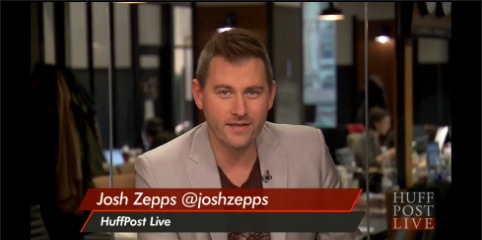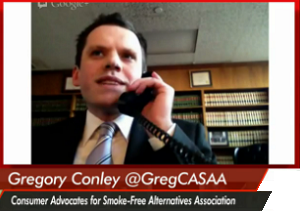
The Huffington Post has uploaded a 24-minute video debate in response to Contra Costa County’s decision to ban vaping in no smoking areas. The move also means that any sellers have to obtain a tobacco retailer license in order to sell any e-cigs. This is a controversial move, since e-cigs are not smoking and release nowhere near the level of chemicals you’d find in a tobacco cigarette, but the fierce debate still rages on.
The debate looks includes Dr. Michael Siegel (from the Boston University School of Public Health), Cynthia Hallet (Executive Director of Americans for Non-Smokers’ Rights), Gregory Conley (from the Consumer Advocates for Smoke-Free Alternatives Association – CASAA), Katherine Mangu-Ward (from Reason Magazine), Dr. David Abrams (From Legacy for Health) and Dan Henry (from puffweb.com).
Cynthia Hallet and Dr. David Abrams are the only two people actively involved in the debate which are actually in favor of the move. Their arguments are pretty easy to sum up. Cynthia opens up the anti-e-cig argument by hitting the classic points of “they’re unregulated” and there hasn't been enough evidence. Well, if she was speaking reasonably, she would have said “enough” evidence, but she actually originally claimed that there hasn't been any research at all. For these fictitious reasons, she is wholly in favor of banning the use of e-cigs in public places.

Dr. Abrams is altogether more moderate, but still comes down in favor of the ban. He says that it’s difficult to make extreme statements either way, but claims that using e-cigs in public is still a public health issue. He points out that using e-cigs in public is an issue because it exposes non-smokers and children to potentially dangerous chemicals, but is mainly concerned about the effect on the normalization of smoking. Apparently, he says that it’s difficult to tell when someone is smoking an e-cig or a cigarette (the presenter quickly corrects him), and says that it could glamorize smoking and further entrench the behavior in society’s consciousness.

Dr. Siegel is logical and fair, as always, agreeing that whilst it might seem to be glamorizing smoking, it’s actually doing the opposite. When people become accustomed to e-cigs, he says, people using them will serve as a billboard for stopping smoking. He also goes to pains to dispel the myths Cynthia Hallet restated (that we don’t know what’s in them and there have been no studies), pointing out that there have been over 30 studies using gas chromatography and mass spectrometry which enable us to know exactly what is in e-cigs and in what proportions. He concedes that the long-term risks are currently unknown, but also points out that in terms of regulation, the FDA will be bringing them under more stringent controls very soon.

Gregory Conley from CASAA comes into the debate just after Cynthia Hallet makes the patently false comment regarding the lack of studies, referencing the recent research which tested twelve e-cigs to identify their components. He reiterates that e-cigs are far, far less harmless than tobacco.

Reason Magazine’s Katherine Mangu-Ward might seem like an odd addition to the debate, but she actually provides a pretty decent insight into what’s going on in the argument. She agrees that there is significant reason to believe e-cigs are saving, or could save people’s lives, and points out that people against e-cigarette don’t give enough weight to that fact. She also postulates that if we were to travel back in time and introduce people to e-cigarettes around thirty years ago, they’d be extremely well-received by public health advocates. This, she argues, shows that the debate has drifted from reducing the risk of cancer and other illnesses to puritanically stating that “smoking is bad.”

This strikes directly to the heart of the debate. All you have to do to understand why is look at Cynthia Hallet’s arguments throughout; she claims that there is no evidence, draws a speculative link between Big Tobacco’s increasing involvement in the industry with their desire to keep everybody addicted to nicotine, and even drags out the old, the-flavors-are-designed-to-attract-children argument. In short, she presents no actual evidence throughout the entire debate, and merely offers an ideological, pathological opposition to anything that looks like smoking.

Dan Henry is quick to point out that since she included piña colada as an example of the flavors being designed to attract children, she is obviously talking nonsense. Adults like chocolate and vanilla too, and to make things worse, a piña colada is an alcoholic drink.
It becomes more and more clear that Michael Siegel, Katherine Mangu-Ward and Gregory Conley offer a reasoned and evidence-based argument, the anti-e-cig debaters continually rest on nothing but speculation and a paternalistic attempt to ban everything just in case it might be dangerous. The presenter is clearly aware of this fact, since he makes loads of jokes about banning nicotine gum or wearing pink shirts because the effects haven’t specifically being studied in depth.
The presenter actually raised one fantastic point in particular, which Katherine, the die-hard rationalist, agreed with wholeheartedly. Since it’s the anti-e-cig crowd who are making absurd claims of risk from a product with well-documented contents and FDA-approved ingredients, it is them who should be the ones providing extensive evidence. Yet throughout the debate, it’s the other way around. Think of it this way, if you had documented proof to back up your opinions, you’d mention it given half the opportunity! The reason they say nothing is because there is nothing substantial.
So, do you want the truth? I warn you, it’s ugly. The reason people are so against e-cigarettes despite having no discernible proof to back up their objections is because they dislike smokers. They dislike smokers so much and so unanimously that it makes no difference to them whether or not smokers can drastically reduce the harm they’re doing to themselves, they just don’t want to see people doing anything that looks like smoking. The facts are indisputable: vaping is considerably safer than smoking. The reason there is backlash from people like Cynthia Hallet and Dr. Abrams is because the prevailing mood in society is that anything in any way like smoking is simply “evil.”

